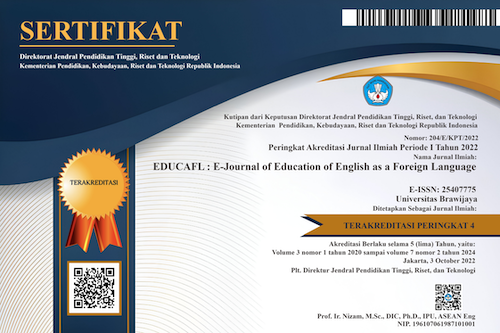LIFE SKILL EDUCATION (LSE) IN NON-FORMAL EDUCATION SETTING
DOI:
https://doi.org/10.21776/ub.Educafl.2019.002.1.6Keywords:
Life Skill Education, non-formal educationAbstract
Life Skill Education (LSE) equips individual to survive in the future. In addition, the importance of life skill cannot be neglected to assist young people to deal with challenges in life by having a skill that enable, equip and empower them with necessary behaviors. LSE is not only applicable in formal, but also informal education. In regards to that, this study tries to investigate the implementation of life skill in non-formal education setting. This qualitative study was conducted in two private libraries in Malang, TBM Wacan and TBM Merdesa with 10 members for each. Participatory observation and document analysis were equipped to gather the data. The result shows that three aspects in life skill, which are thinking skill, emotional skill and also social skill were explored. These aspects were then is formed in various activities such as poster creation, language games, disaster mitigation simulation, and role play.
References
Al, A., Mona, M., Amal, S., & Wafaa, A. (2016). The Inclusion of Life Skills in English Textbooks in Jordan, 7(16), 81–96.
Anand, D., & Anuradha, R. K. (2016). Life skill based education for sustainable future of adolescent girls, 2(2), 213–217.
Bardhan, A. (2016). Life Skills Education: A Strategy for Handling Adolescents’ Risk Behavior. IOSR Journal of Humanities and Social Science, 21(7), 92–99. https://doi.org/10.9790/0837-2107059299
Dist, I., Paul, M. N., & Babu, J. (2018). Original Research Paper Social Science ROLE OF PARENTS FOR THE LIFE SKILL DEVELOPMENT OF CHILDREN WITH LEARNING DISABILITY M . Phil Scholar at School of Social Work , Marian College Kuttikkanam ( Autonomous ), (8), 17–20.
Erawan, P. (2010). Developing life skills scale for high school students through mixed methods research. European Journal of Scientific Research, 47(2), 169–186. Retrieved from http://scholar.google.com/scholar?hl=en&btnG=Search&q=intitle:Developin g+Life+Skills+Scale+for+High+School+Students+through+Mixed+Methods +Research#8
Eshach, H. (2007). Bridging in-school and out-of-school learning: Formal, non-formal, and informal education. Journal of Science Education and Technology, 16(2), 171–190. https://doi.org/10.1007/s10956-006-9027-1
Ghombavani, F. P. (2016). Effects of Life Skills Training On Improving Critical Thinking among Iranian Fifth Grade Primary School Girls.
Kumari, K. V. R. P. (2016). Opinion of Teachers for Inclusion of Life Skills Education in Secondary Schools of Visakhapatnam District, (9), 1760–1767.
Munsi, K., & Guha, D. (2014). Status of life skill education in teacher education curriculum of saarc countries : A comparative evaluation. Journal of Education and Social Policy, 1(1), 93–99.
Ramdhani, M. (2015). Implementasi Pendidikan Life Skill Di Pesantren Pertanian Darul Fallah Bogor Implementation Of Life Skill Education In Agriculture Boarding School, 4(c), 53–64.
Satori, D. & S. S. U. (n.d.). Implementasi Program “Life Skills†Dan “Broad-Based Education†Sebagai Strategi Peningkatan Mutu Pendidikan Dasar Dan Menengah.
Schurer, S. (2017). Does education strengthen the life skills of adolescents? IZA World of Labor, (June), 1–11. https://doi.org/10.15185/izawol.366
Syomwene, A. (2016). European Journal of Education Studies Internal Curriculum Supervision Of Life Skills Education In Public Secondary Schools : A Case Of Lugari Sub-County , Kenya, 14–34.
UNICEF. (2012). Global Evaluation of Life Skills Education Programmes. Evaluation Office, (August), 177.
Wahyuni, E. S. (2016). Peningkatan Life Skill melalui Pembelajaran berbasis Keunggulan Lokal Life Skill Improvement through Learning Local Benefits, 13(1), 455–460.
Downloads
Published
Issue
Section
License
Authors who publish with this journal agree to the following terms:
- Authors retain copyright and grant the journal right of first publication with the work simultaneously licensed under a Creative Commons Attribution License that allows others to share the work with an acknowledgement of the work's authorship and initial publication in this journal.
- Authors are able to enter into separate, additional contractual arrangements for the non-exclusive distribution of the journal's published version of the work (e.g., post it to an institutional repository or publish it in a book), with an acknowledgement of its initial publication in this journal.
- Authors are permitted and encouraged to post their work online (e.g., in institutional repositories or on their website) prior to and during the submission process, as it can lead to productive exchanges, as well as earlier and greater citation of published work (See The Effect of Open Access).



